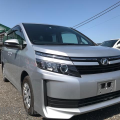Requirements, Process, and Timeline
Are you considering importing a car from Japan to Kenya? At Devart Auto Company, we guide you through the essential steps, requirements, and timelines to ensure a smooth process. Located along Langata Road, opposite Uhuru Gardens in Nairobi, we are committed to making car importation seamless and hassle-free.
Why Import from Japan?
Japan is known for its reliable, affordable, and well-maintained vehicles. Many Kenyans prefer importing cars from Japan due to their high quality and cost-efficiency. Whether you are looking for a family car, SUV, or luxury vehicle, the Japanese market offers a vast selection to meet your needs.
Requirements for Importing a Car from Japan to Kenya
Before you begin the car importation process, there are a few key requirements you should be aware of:
- Age Limit: Imported cars must not be older than eight years from the date of manufacture. This is regulated by the Kenya Bureau of Standards (KEBS).
- Roadworthiness Inspection: All vehicles imported into Kenya must undergo a roadworthiness inspection by the Japan Export Vehicle Inspection Centre (JEVIC). This inspection ensures the vehicle meets Kenyan standards.
- Vehicle Documents: You will need the following documents to facilitate the importation:
- Original commercial invoice
- Original bill of lading (BOL)
- Export certificate from Japan
- JEVIC certificate
- Original logbook
- Tax and Duties: Importing a car to Kenya involves several taxes and duties, including:
- Import Duty (25% of the CIF value)
- Excise Duty (20% of the CIF value)
- Value Added Tax (VAT) (16% of the sum of CIF, Import Duty, and Excise Duty)
- Import Declaration Fee (2% of the CIF value)
- Railway Development Levy (1.5% of the CIF value)
CIF (Cost, Insurance, and Freight) value is calculated as the total cost of the car, insurance, and freight to the port of Mombasa.
Shipping and Delivery Timeline
Cars imported from Japan to Kenya are typically shipped via sea freight, and the process generally follows this timeline:
- Purchase and Shipping: Once you’ve purchased the car from a Japanese dealer, it is loaded and shipped to the Port of Mombasa. This usually takes about 30–45 days depending on shipping schedules and weather conditions.
- Customs Clearance: After arrival at the port, the customs clearance process begins. This typically takes about 5–10 days. During this time, the vehicle is inspected, and taxes and duties are calculated and paid.
- Vehicle Registration: Once the vehicle is cleared by customs, it will need to be registered with the National Transport and Safety Authority (NTSA). This process involves obtaining Kenyan number plates and takes around 1–3 days.
Custom Clearance Process
Clearing your car through customs is a critical step. Here’s a breakdown of the steps involved:
- Import Declaration Form (IDF): You will need to fill out an IDF with the Kenya Revenue Authority (KRA) before the vehicle arrives. This form is essential for clearing the car at the port.
- Customs Duty Payment: After your vehicle arrives at the Port of Mombasa, customs officials will assess the taxes and duties payable. These must be paid before the vehicle is released.
- Verification and Inspection: KEBS will inspect the vehicle for roadworthiness, ensuring it meets all safety and environmental standards.
- Clearing Agent: Hiring a licensed clearing agent can expedite the process. They will handle the documentation and liaise with customs officials on your behalf.
- Port Charges: Ensure all port-related charges, such as demurrage fees, are settled. Late clearance may incur extra fees.
Tips for a Smooth Importation Process
- Choose a Reputable Dealer: Always buy from trustworthy dealers to avoid scams or buying faulty vehicles.
- Plan for Taxes: Understanding the taxation structure helps you budget properly. Get a pre-importation valuation from KRA to know the exact duties in advance.
- Use a Clearing Agent: A professional clearing agent can save you time and help you navigate the customs process.
- Monitor Shipping Progress: Keep in touch with your shipping company for updates on your car’s arrival.
Conclusion Importing a car from Japan can be a straightforward process when you understand the requirements and timelines. At Devart Auto Company, we’re here to guide you every step of the way, from selecting the best vehicle to handling customs clearance. Visit us along Langata Road, opposite Uhuru Gardens, and let us help you get the car of your dreams from Japan to Kenya.


